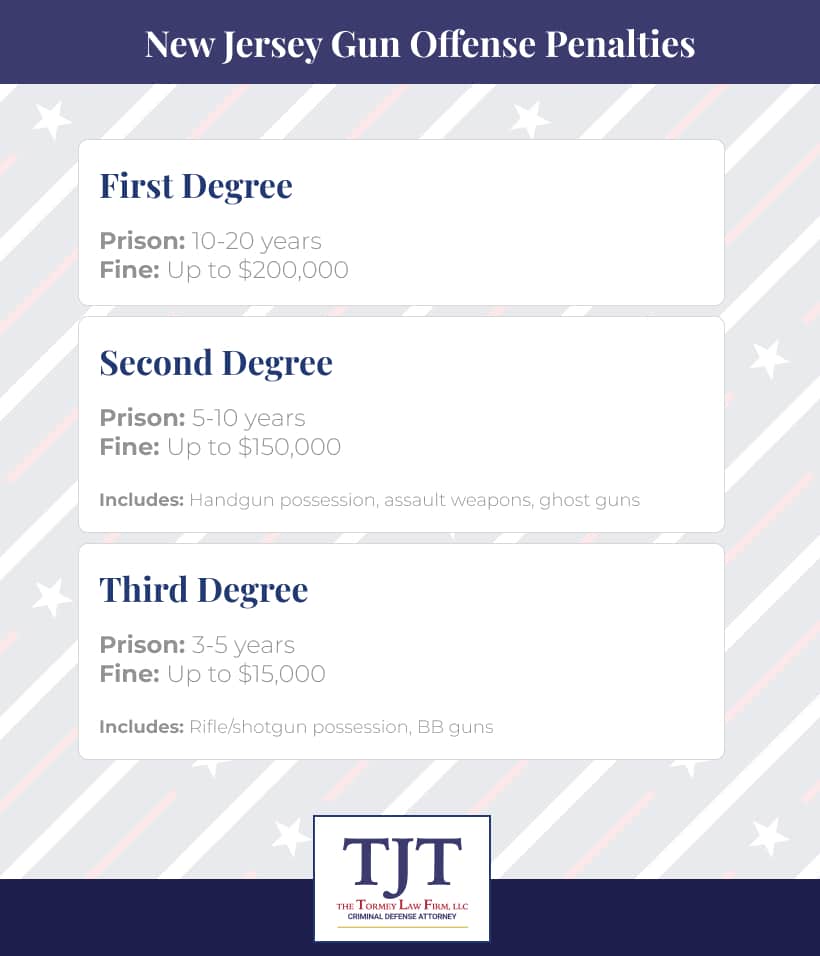The Reality of Gun Convictions in NJ and Their Severe Penalties
Understanding NJ’s Zero-Tolerance Gun Laws

Types of Firearm Possession Offenses and Their Legal Consequences in New Jersey
Unlawful possession of a firearm without a permit is a crime in New Jersey. Possession of a handgun (pistol or revolver) is a second-degree crime that carries a sentence of 5 to 10 years and a fine of up to $150,000. There is a mandatory minimum of 42 months or one-third to one-half of the sentence before parole is a possibility under the Graves Act. Possession of a rifle or shotgun is a third-degree crime and carries a sentence of 3 to 5 years, as well as a fine of up to $15,000. Contrary to what the majority of people believe, weapons such as pellets or BB guns are considered firearms in New Jersey and are considered a third-degree offense.
Possession of an illegal firearm also comes with its own set of penalties. Possession of an assault weapon or semi-automatic pistol that fires more than 10 rounds at a time is a second-degree crime, meaning there is a presumption of incarceration. Ghost guns, also known as Privately Made Firearms, are built using a 3D printer or from a kit that contains the parts of the weapon that can be assembled. What makes these weapons particularly dangerous is that a license is not needed to create one, and no serial on the weapon could trace it to its owner. It is a second-degree crime to make, distribute, sell, or share ghost guns. Also, using or possessing digital instructions, kits, or codes that can be used to produce a whole firearm or its parts is a second-degree crime. If a firearm is defaced, it is a fourth-degree crime. A defaced firearm whose serial number has been removed. Weapons whose make and model have been changed or destroyed also fall into this category.

Firearm-Related Criminal Conduct and Restricted Possession
The possession of a firearm for an unlawful purpose is a serious crime. In this case, not only are there gun charges, but additional charges for other illicit conduct. Having a firearm with the purpose of using it unlawfully is a second-degree crime. Possessing or transferring a community gun to use in the commission of a crime is also a second-degree offense. A community gun is exchanged between two or more people who engage in criminal activity. Violent crimes such as assault, robbery, kidnapping, and murder involve guns. The sentence for the gun charge and any other sentences associated with that charge can mean long sentences. The court will decide whether the sentences are to run concurrently or consecutively.
Some people are legally prohibited from owning firearms and are identified as Certain Persons Not To Have Weapons. Those who have been committed to a hospital or mental institution, unless medically released to own a weapon, cannot obtain a gun license. Those convicted of an indictable crime for the unlawful use, possession, or sale of a controlled substance and anyone convicted of domestic violence cannot own guns. A conviction for homicide, kidnapping, aggravated assault, robbery, extortion, sexual assault, and other violent crimes prohibits the offender from owning a gun. This offense is considered a second-degree crime when the defendant commits a violent crime while in possession of a firearm. This carries a 5 to 10-year sentence. Suppose the defendant was convicted previously of domestic violence and possesses a firearm. In that case, it is a third-degree offense and punishable by up to three years. A fourth-degree crime is punishable by up to 18 months when the defendant has a weapon that is not a firearm (knives, brass knuckles, clubs).
Aggravating or Mitigating Circumstances Shape Sentences
The factors that can increase charges and sentencing are called aggravating factors. Some of these include the physical harm caused by the offender to their victims, prior convictions, gang violence, drug-related violence, particularly violent and intentional harm, premeditation, or domestic violence. The factors that may help the defendant are called mitigating factors. Circumstances such as a lack of a criminal record, mental health issues, someone who is young and has a history of abuse or poverty, and cooperation with law enforcement can be helpful to the defendant.
A Gun Conviction Can Shut Doors You Didn’t Expect

A gun conviction also takes away a person’s right to own a weapon. Moreover, other unexpected consequences include difficulty renting someplace to live. When applying for credit for a car or home, a gun conviction can affect your ability to get approved for a loan. Finding a job can be challenging, especially in areas involving money, education (children), and vulnerable people, such as the elderly or infirm. Getting accepted into a trade school or college may also be an uphill battle with a gun charge.
Facing Criminal Gun Charges? Get Immediate Legal Defense from a NJ Experienced Weapons Crime Attorney
New Jersey gun laws are some of the strictest in the nation. Having a skilled attorney can make a significant difference in the outcome of your case. They can challenge the evidence brought by the prosecution and scrutinize the legality of any searches that were performed and how the evidence was handled. Your attorney can negotiate with the prosecution to get a reduced charge or get the charges dropped altogether. Gun-related charges are often resolved through this kind of negotiation. A lesser charge could mean a lighter sentence that will have less of an impact on your future. If the case goes to trial, your attorney will build a compelling defense and ensure that your side of the story is explained by countering the prosecution’s claims with evidence to support your case. Throughout the entire legal process, the most important job for your attorney is to guarantee that your rights are protected in Belvidere, Elizabeth, Totowa, Little Falls, Hackensack, Paterson, Bridgewater, or elsewhere in New Jersey. They will ensure that you are treated fairly and you understand every step of the process. They will protect your constitutional rights and will give you the best chance for a favorable outcome. Contact The Tormey Law Firm today at (201)-614-2474
